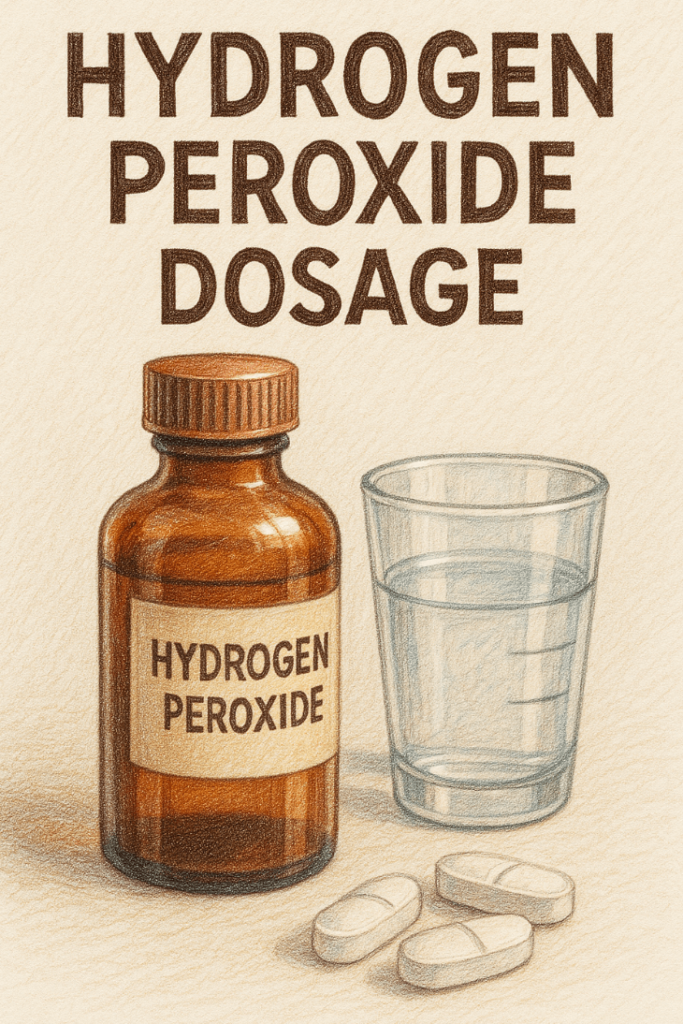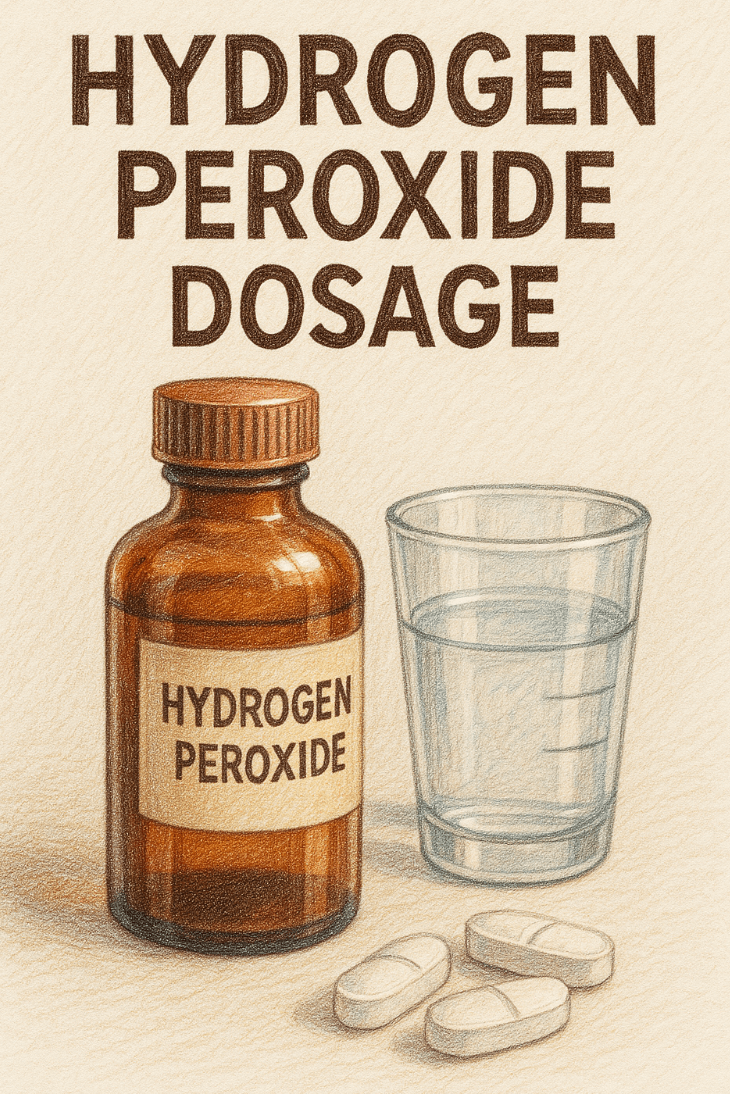Hydrogen Peroxide Dosage: What You Need to Know
Hydrogen peroxide is a versatile household staple, often used for cleaning wounds, disinfecting surfaces, and even as a remedy for certain health concerns. However, understanding the correct hydrogen peroxide dosage is crucial to ensure safety and effectiveness. Whether you’re using it for first aid, oral hygiene, or other purposes, improper dosing can lead to irritation, adverse reactions, or unintended consequences. In this blog post, we’ll explore the appropriate dosages for various applications, safety guidelines, and tips for responsible use. By the end, you’ll have a clear understanding of how to use hydrogen peroxide safely and effectively.
Common Uses of Hydrogen Peroxide and Recommended Dosages
Hydrogen peroxide comes in different concentrations, and the appropriate dosage varies depending on its intended use. Here’s a breakdown of common applications and their recommended dosages.
Wound Cleaning (3% Solution):
Use a small amount of 3% hydrogen peroxide to clean minor cuts or scrapes. Apply directly to the affected area and rinse with water afterward.Mouth Rinse (1-1.5% Solution):
Dilute 3% hydrogen peroxide with equal parts water to create a safe mouth rinse. Swish gently for 30 seconds, then spit out—never swallow.Surface Disinfection (3% Solution):
Spray undiluted 3% hydrogen peroxide onto countertops, sinks, or other surfaces. Let it sit for 5-10 minutes before wiping clean.Ear Cleaning (3% Solution):
Mix one part 3% hydrogen peroxide with one part water. Use a few drops in each ear to loosen earwax, but consult a doctor if unsure.Tooth Whitening (1-3% Solution):
Add a small amount of diluted hydrogen peroxide to toothpaste or use it as a rinse after brushing. Avoid prolonged use to prevent enamel damage.
Always match the dosage to the task at hand, and never exceed the recommended concentration for any application.
Safety Guidelines for Using Hydrogen Peroxide
While hydrogen peroxide is widely available and easy to use, safety should always be your top priority. These guidelines will help you avoid misuse and potential harm.
Avoid High Concentrations (Above 3%):
Higher concentrations, such as 10% or 35%, are not safe for household use and can cause severe burns or respiratory issues.Do Not Swallow:
Ingesting hydrogen peroxide, even in small amounts, can irritate the stomach lining or lead to more serious complications.Test for Skin Sensitivity:
Before applying hydrogen peroxide to large areas of skin, test a small patch to check for irritation or allergic reactions.Use Fresh Solutions:
Hydrogen peroxide breaks down over time when exposed to light, so always use fresh bottles for maximum effectiveness.Keep Out of Reach of Children:
Store hydrogen peroxide in a secure location to prevent accidental ingestion or misuse by children.
Following these safety tips ensures that hydrogen peroxide remains a helpful tool rather than a potential hazard.
Check this guide 👉Is Hydrogen Peroxide Safe for Dogs? Best 7 Tips!
Check this guide 👉Is Lemongrass Safe for Dogs? Best 7 Expert Tips!
Check this guide 👉Is Phlox Safe for Dogs? Best 7 Expert Tips!

Safe Applications of Hydrogen Peroxide | Risks of Improper Use |
|---|---|
Cleaning minor cuts and scrapes | Skin irritation or chemical burns |
Disinfecting household surfaces | Damage to delicate materials like fabric |
Whitening teeth (in moderation) | Enamel erosion with overuse |
Loosening earwax buildup | Ear canal irritation or infection |
Rinsing for oral hygiene | Mouth sores or discomfort if misused |
Signs of Overuse or Incorrect Dosage
Using hydrogen peroxide improperly can lead to adverse effects. Recognizing these signs early allows you to take corrective action and prevent further harm.
Skin Irritation or Burns:
Redness, swelling, or blistering may occur if high-concentration solutions are applied to the skin.Respiratory Issues:
Inhalation of vapors from concentrated hydrogen peroxide can cause coughing, shortness of breath, or throat irritation.Nausea or Vomiting:
Accidental ingestion often leads to gastrointestinal distress, including nausea, vomiting, or abdominal pain.Enamel Damage:
Excessive use of hydrogen peroxide for teeth whitening can weaken enamel, leading to sensitivity or discoloration.Delayed Wound Healing:
Overuse on open wounds may kill healthy tissue, slowing the healing process instead of promoting it.
If you notice any of these symptoms, discontinue use immediately and seek medical advice if necessary.
Alternatives to Hydrogen Peroxide for Common Uses
While hydrogen peroxide is effective for many tasks, safer alternatives exist for those who prefer gentler options. Consider these substitutes based on your needs.
For Wound Care:
Saline solution or mild soap and water are excellent alternatives for cleaning minor injuries without the risk of irritation.For Oral Hygiene:
Saltwater rinses or alcohol-free mouthwash provide similar benefits without the potential side effects of hydrogen peroxide.For Surface Cleaning:
Vinegar and baking soda make a natural, non-toxic cleaning solution for most household surfaces.For Earwax Removal:
Over-the-counter ear drops designed specifically for wax removal are safer and more comfortable than DIY solutions.For Teeth Whitening:
Professional whitening treatments or whitening toothpaste offer controlled results without risking enamel damage.
These alternatives cater to individuals seeking effective yet gentle solutions for everyday needs.
Myths About Hydrogen Peroxide Debunked
Misinformation about hydrogen peroxide can lead to improper use. Let’s debunk some common myths to set the record straight.
“Higher concentrations are always better.”
Higher concentrations increase the risk of harm and are rarely necessary for household tasks.“It’s safe to ingest small amounts.”
Even small amounts can irritate the digestive tract; ingestion should always be avoided.“It speeds up wound healing.”
While it cleans wounds, excessive use can delay healing by damaging healthy tissue.“It works as a universal cleaner.”
Hydrogen peroxide can damage certain materials, such as fabrics or porous surfaces.“Dilution isn’t necessary for minor uses.”
Diluting reduces the risk of irritation and ensures safer application.
Separating fact from fiction helps you use hydrogen peroxide responsibly and effectively.
Tips for Storing Hydrogen Peroxide Safely
Proper storage extends the shelf life of hydrogen peroxide and prevents accidents. Follow these tips to keep it secure and effective.
Store in a Dark Container:
Light accelerates decomposition, so transfer hydrogen peroxide to opaque bottles if needed.Keep Away from Heat Sources:
High temperatures can degrade the solution faster, reducing its potency.Label Clearly:
Mislabeling can lead to accidental misuse, especially in households with multiple cleaning products.Check Expiration Dates Regularly:
Discard expired bottles to avoid using ineffective or degraded solutions.Use Childproof Caps:
Prevent accidental spills or ingestion by securing containers with child-resistant caps.
These practices ensure hydrogen peroxide remains safe and ready for use whenever needed.
When to Consult a Professional About Hydrogen Peroxide Use
While hydrogen peroxide is generally safe for minor tasks, there are situations where professional advice is essential.
Persistent Symptoms After Use:
If irritation, pain, or other symptoms persist after using hydrogen peroxide, consult a doctor promptly.Treating Severe Injuries:
Deep wounds, burns, or infections require medical attention rather than home remedies.Uncertainty About Dosage:
When unsure about the correct dosage or application, seek guidance from a pharmacist or healthcare provider.Pregnancy or Nursing Concerns:
Pregnant or nursing individuals should confirm safety before using hydrogen peroxide medicinally.Pets and Animals:
Never use hydrogen peroxide on pets without veterinary approval, as it may cause harm.
Knowing when to seek help ensures you use hydrogen peroxide safely and responsibly.
Frequently Asked Questions About Hydrogen Peroxide Dosage
What is the safest concentration of hydrogen peroxide for home use?
A 3% solution is the safest and most commonly available concentration for household purposes.
Can I use hydrogen peroxide on deep wounds?
No, hydrogen peroxide is not suitable for deep or heavily bleeding wounds. Seek professional medical care instead.
Is it safe to gargle with hydrogen peroxide daily?
No, frequent use can irritate oral tissues. Limit usage to once or twice a week unless advised otherwise by a dentist.
How long does hydrogen peroxide last once opened?
Once opened, hydrogen peroxide typically remains effective for 30-90 days, depending on storage conditions.
What should I do if I accidentally ingest hydrogen peroxide?
Drink water immediately and contact poison control or a healthcare provider for further guidance.
Using Hydrogen Peroxide Responsibly for Optimal Results
Hydrogen peroxide is a powerful and versatile tool, but its effectiveness depends on proper usage and adherence to safety guidelines. By understanding the correct dosages, recognizing potential risks, and exploring alternative options, you can harness its benefits while minimizing hazards. Always prioritize caution and consult professionals when in doubt. With the right approach, hydrogen peroxide can remain a reliable ally in your household toolkit, ensuring both cleanliness and peace of mind.
Do Cats Have Taste Buds? Best 7 Expert Tips! – Discover how cats experience flavors and why their taste is so unique.
Do Dogs Have Taste Buds? Best 7 Expert Tips! – Discover how dogs experience taste, their preferences, and what it means for their diet and health.
Can Cats Taste Sweet? Best 7 Expert Tips! – Discover why cats can’t taste sweetness, how it affects their diet, and tips to keep them healthy and happy.
Can Dogs Taste Sweet? Best 7 Expert Tips! – Discover how dogs perceive sweetness, which foods are safe, and tips to manage their sweet cravings responsibly.





